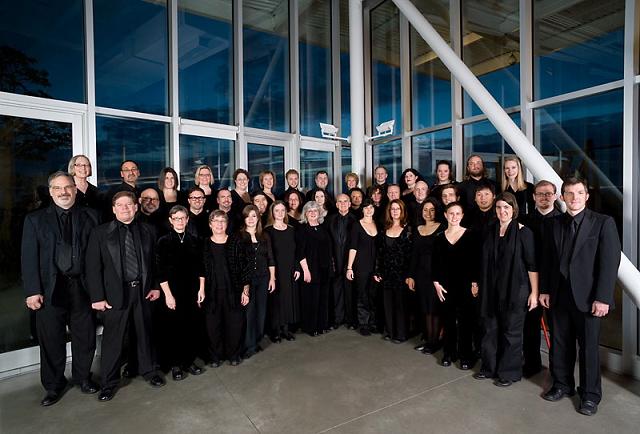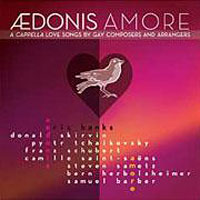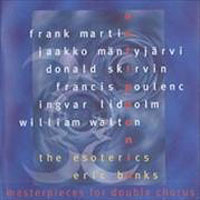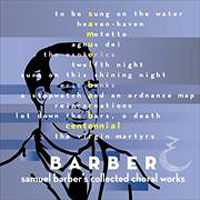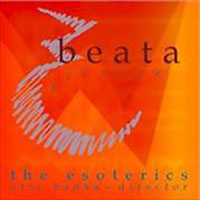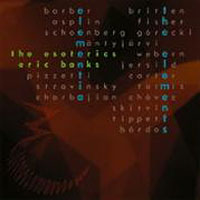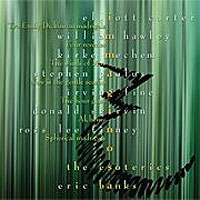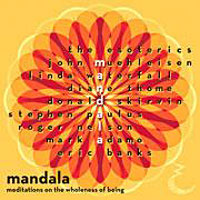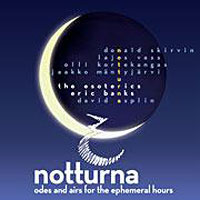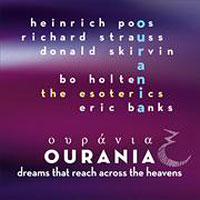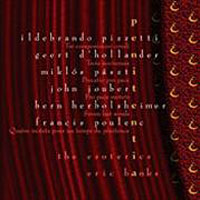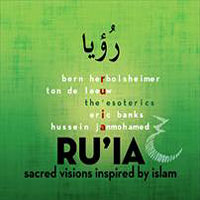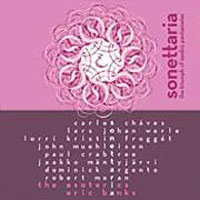In Celebration of the Human Voice - The Essential Musical Instrument
Home | Doo Wop | Barbershop | World | Contemporary | Christian | Vocal Jazz | Choral | Christmas | Instructional | Arrangements
Classical | Opera | Musicals | Personality | Young Singers | Disney | Videos | Songs | The Artists

The Esoterics
Seattle's most innovative chorus has drawn local, national, and international praise for performing rarely-heard compositions of contemporary music for unaccompanied voices, for infusing elements of the literary, theatrical, and visual arts into the typical concert experience, and for performing settings of poetry, philosophy, and spiritual writings from around the world.
In early 1992, Eric Banks brought together a group of singing friends to perform his Master's and Doctoral recitals in Choral Studies at the University of Washington. After Banks recitals were completed, the group wanted to keep singing together, so Banks chose a name for his ensemble based on the Greek adjective which describes a close-knit community and the secret knowledge that its members share.
Since incorporating with this name in 1993, The Esoterics has performed over 300 concerts throughout the Pacific Northwest, has commissioned and premiered more than 100 new works for a cappella voices in dozens of languages, and has mastered many of the most virtuosic choral compositions of the last century in concerts described as compelling and crafted, Luxuriant and lyrical, sumptuous and superb.
The Esoterics has released eleven CD recordings to date - BEATA, ANTIPHONIA, ELEMENTIA, PENITENTIA, IMMAGINOSA, AMORE, SONETTARIA, NOTTURNA, MANDALA, RU'IA, and OURANIA several which have been favorably reviewed in The Gramophone and American Record Guide. The ensemble has been honored as the only North American chorus invited to compete in the 2000 Cork International Choral Festival (Ireland), the 2001 Certamen Coral de Tolosa (Spain), and the 2006 Harald Andersen International Choir Competition in Helsinki (Finland).
Always on the search for the next great choral masterpiece, The Esoterics inaugurated its annual choral composition competition, POLYPHONOS, in 2006. Through this competition, The Esoterics awards commissions to three composers each year including a national winner, an international winner, and a young winner (under age 30). As well, The Esoterics has demonstrated its complete commitment to choral education as the only choral ensemble in Washington State that grants continuing-education credit to its members who also teach in the public schools.
In recognition for its efforts in choral education and innovation, The Esoterics has been honored four times with the Chorus America Award for the Adventurous Programming of Contemporary Music (in 2001, 2003, 2006, and 2008). The Esoterics has been honored to receive several grants from the arts commissions of Washington State, King County, and the City of Seattle, as well as from ArtsFund, The Seattle Foundation, and The National Endowment for the Arts. The Esoterics is a proud member of the American Choral Director's Association, Chorus America, the International Federation for Choral Music, and GALA, the Gay and Lesbian Association of Choruses.
Discography
Displaying 1-12 of 12 items.
Review: Named for the acient Greek word for "nightingale," AEDONIS is The Esoterics' fledgling men's ensemble. Their debut CD entitled AMORE features compositions by Franz Schubert, Pyotr Tchaikovsky, Camille Saint-Saens, and Samuel Barber. Also on this disc are Love letters, four Tatar folksongs arranged by Bern Herbolsheimer, Ngam sang duan, a Thai song arranged by Steven Sametz, as well as two new works by Donald Skirvin: Songs of the nightingale, and Yet, love endures, a cycle of four poems by Hart Crane. The final work of this disc is Eric Banks' cycle of seven sonnets that Michelangelo composed for his lover, Tomasso de' Cavalieri, entitled Sonneti d'amore.
Songlist: Calme des nuits (1882), Songs of the nightingale (2004), The sweet nightingale (2006), Gold and silver - Love letters (2005), Red or coral - Love letters (2005), White - Love letters (2005), Rosy - Love letters (2005), Solovushko (1889), Ngam sang duan (2000), Mondenschein (1826), To be sung on the water (1968), And bees of paradise - Yet, love endures (2005), Echoes - Yet, love endures (2005), A stolen hour - Yet, love endures (2005), Worn more bright - Yet, love endures (2005), And both shall row (2001), Quanta dolcezza - Sonetti d'amore (2006), Ovunche tu ti sia - Sonetti d'amore (2006), Un dolce lume - Sonetti d'amore (2006), Nodo d'amore, Quanta docezza (Ritornello) - Sonetti d'amore (2006), E vie piu la - Sonetti d'amore (2006), Non ti contenti - Sonetti d'amore (2006), O felice quel di - Sonetti d'amore (2006), Quanta docezza (Ritornello) - Sonetti d'amore (2006)
Review: ANTIPHONIA captures the acclaimed program that The Esoterics reprised in Seattle, Portland, Tacoma and Everett in November 1999. ANTIPHONIA consists of six choral masterpieces, each from a different nationality - Swedish and Swiss, Finnish, and French, British and American - and each with a unique rendition of antiphony (from the Greek antiphon, "singing across"). The Seattle Post-Intelligencer deemed The Esoterics' performance of ANTIPHONIA a "triumph" and a program "as difficult as any have undertaken." The journal 21st Century Music praised the sound of the group as "sublime, pure, luxuriant, velvety ... The initial phrases gave me chills; it was as if angels were singing."
Songlist: Kyrie- Messe pour double choeur, Gloria - Messe pour double choeur, Credo - Messe pour double choeur, Sanctus - Messe pour double choeur, Agnus Dei - Messe pour double choeur, Ancient Roses - Echoes from the Heart, Longing, Dreaming - Echoes from the Heart, I Remember - Echoes from the Heart, Cantico del sole, ...a riveder le stelle, Bientot - Figure humaine, Le role de femmes - Figure humaine, Aussi bas que le silence - Figure humaine, Patience - Figure humaine, Premiere marche la voix d'un autre - Figure humaine, Un loup - Figure humaine, Un feu sans tache - Figure humaine, Liberte - Figure humaine, Pseudo-yoik, Antics
Review: This recording was made in conjunction with The Esoterics' centennial concert of the same name, celebrating the 100th anniversary of the American composer Samuel Barber. This is the first recording by an American choral ensemble to feature all of Barber's works for a cappella chorus. Barber is one of the most important figures in American composition, having twice won the Pulitzer Prize. Purchase your copy of this historic recording by one of the country's premiere vocal ensembles for contemporary choral music! This recording, made in the lush acoustics of Seattle's Holy Rosary Catholic Church, is the first recording to bring together God's grandeur and Motetto on words from the book of Job, which Barber had intended to be performed as a single cycle. Also included in this recording are three choral works that are normally performed with instruments (Easter chorale, A stopwatch and an ordnance map, and Sure on this shining night). For these three pieces, the ensemble sings the instrumental parts (for brass, timpani and piano) as well as the choral parts. This recording, directed by The Esoterics' Founding Director Eric Banks, is an excellent interpretation of Barber's neo-romantic style and was engineered using binaural recording technology.
Songlist: There the wicked cease - Motetto, Call now! - Motetto, God's grandeur - Motetto, Praise him! - Motetto, Twelfth night, Easter chorale, Heaven-haven, Let down the bars, O death, The virgin martyrs, A stopwatch and an ordnance map, To be sung on the water, Mary Hynes - Reincarnations, Anthony O Daly - Reincarnations, The coolin - Reincarnations, Agnus Dei, Sure on this shining night, Happy birthday, Sam Barber
Review: The Esoterics' first CD, BEATA, celebrates the Virgin Mary as a symbol of purity and devotion, as well as an inspiration for centuries of music. Comprising eighteen compositions from nearly as many countries, this recording presents unaccompanied choral music about Mary from every continent and each decade of this century. This contemporary repertoire is interspersed with strophes of the sequence, O virga ac diadema, by the renowned medieval mystic, poet, and abbess, Hildegard of Bingen (1098-1179). BEATA was originally performed and recorded in July 1997 (after our highly acclaimed performance of the same title) in a true-to-performance style, where each piece is heard as it was performed, and no gratuitous editing occurred during the mastering process.
Songlist: Hymne a la Vierge, Ave maris stella, Hil dig, havets stjerne, I, Tota pulchra es, Maria, Canticum Mariae Virginis, I beheld her, beautiful as a dove, II, Ave Maria, cheiaa di graca, Ave Maria, cheia di graca, Magnificat, O magnum mysterium, Es ist ein Reis entsprungen, Morning-song for the Christ Child, III, Ave Maria, gratia plena, Ave Maria, gratia plena, Maria durch ein Dornwald ging, IV, Bogoroditse dyevo, raduisya, Bogoroditse dyevo, raduisya, Mater ora filium
Review: ELEMENTIA, the third release from The Esoterics, is a double CD set that encompasses some of the best works from Season 2000. With more than two hours of music, ELEMENTIA features world premiere recordings by Northwest composers Donald Skirvin, Garrett Fisher, and David Asplin. Over the course of the year 2000, The Esoterics celebrated each of the four ancient elements from various vantage points, presenting the sounds and stories of different cultures - weaving music and mythology, science and sociology - to create a broader appreciation of EARTH, WATER, AIR, and FIRE. ELEMENTIA is a compilation of works from these concerts, with world premieres and 20th century classics. The repertoire spans continents and styles, with a range of new favorites and choral classics from Britten, Carter, Pizzetti, Stravinsky, Barber, and more. Kim Davenport of new-music.org said of the EARTH concert performed in Tacoma, "Seldom is one treated to a choral ensemble of such skill, with stunning balance, rhythmic precision, warmth of sound, a wonderfully broad dynamic range, and impeccable diction in every language sung."
Songlist: In Nature's charm - Earth, New World/ Due composizioni corali - Earth, Il giardino di Afrodite - Earth, Piene sorgeva la luna - Earth, A foldhez - Earth, Min yndlingsdal - Earth, Friede auf Erden - Earth, Riverrun - Water, Wheel of Dreams - Water, To Be Sung on the Water / Szeroka woda- Water, A ta nasza Narew - Water, Oj, kiedy na Powislu - Water, Oj, Janie, Janie - Water, Polne roze rwala - Water, Szeroka woda - Water, Natteregn - Water, Canticum,calamitatis maritimae - Water, Autumn - Air, The Delight Song of Tsoai-talee - Air, Dance, Clarion Air - Air, Entflieht auf leichten Kahnen/ Szeged felol - Air, Szeged felol - Air, Nem porzik - Air, Angyi sutott retest... - Air, Sej haj, liba liba... - Air, Aftenroden - Air, Suglsmaastikud - Air, Anthem - Fire, Cedar Smoke and Snowflake - Fire, Twelfth Night - Fire, Nonantsin - Fire, Tuz-szivarvany - Fire, To Music - Fire, Hymn to St Cecilia
Review: The Esoterics' fifth CD, IMMAGINOSA features premieres by William Hawley and Stephen Paulus and other pieces that represent springtime song cycles on love and life. Recorded after the IMMAGINOSA concert series in May 2004, this CD features several of The Esoterics' favorite cycles. Ross Lee Finney's Spherical madrigals resonates with the exploration and creativity of the Age of Reason, and Irving Fine's artful cycle of six Ben Jonson poems - The hour glass - traverses the evolution of love during the human lifetime. The second half of IMMAGINOSA will either put spring in your step or send you off into blissful dreams. First, revel in recordings of two premiere performances: Four reveries by New York composer William Hawley, followed by a spring madrigal, Now is the gentle season, by Minnesota composer Stephen Paulus. Next, enjoy two contrasting settings of Emily Dickinson by Elliott Carter - Heart not so heavy as mine and Musicians wrestle everywhere. Finally, immerse yourself in two cycles of spectacular strophes by Sara Teasdale: The winds of May by San Francisco composer Kirke Mechem, and Donald Skirvin's Alchemy, which was commissioned by The Esoterics.
Songlist: O know to end as to begin- The hour-glass (1949), Have you seen the white lily grow? - The hour-glass (1949), O do not wanton with those eyes - The hour-glass (1949), Against jealousy - The hour-glass (1949), Lament - The hour-glass (1949), The hour-glass - The hour-glass (1949), Echo - Four reveries (1995), Remembrance - Four reveries (1995), My river runs to thee - Four reveries (1995), Meeting at night - Four reveries (1995), Heart not so heavy as mine (1938), Now is the gentle season (1978), Love is a circle - Spherical Madrigals (1947), When again all these rare perfections meet - Spherical Madrigals (1947), All-circling point - Spherical Madrigals (1947), His body was an orb - Spherical Madrigals (1947), On a round ball - Spherical Madrigals (1947), Nor doe I doubt - Spherical Madrigals (1947), See how the Earth - Spherical Madrigals (1947), Musicians wrestle everywhere (1945), The tune - The winds of May (1965), Let it be forgotten - The winds of May (1965), Over the roofs - The winds of May (1965), I shall not care - The winds of May (1965), Song - The winds of May (1965), Living gold - Alchemy (2002), Cups of fire - Alchemy (2002), Jewelled blaze - Alchemy (2002), O Beauty - Alchemy (2002)
Review: From the Sanskrit word for 'circle' or 'completion,' the title of this recording refers to a wide variety of symbols that prevail throughout several spiritual traditions. In more contemporary Western society, the concept of the mandala is used to describe the personal world in which one lives: the activities and interests in which one partakes, as well as those with whom one chooses to associate. MANDALA: such an all encompassing word makes a fitting title for a recording (a CD is a circle, after all!) of choral music themed around meditations on the wholeness of being. Singing in a variety of Eastern languages, The Esoterics have given voice to meditations of several faiths and spiritual practices, including verses inspired by Sufism (by director Eric Banks), Hinduism (by Roger Nelson and Diane Thome), Taoism (by Linda Waterfall, Mark Adamo, and Stephen Paulus), and Buddhism (by John Muehleisen and Donald Skirvin). Each of these eight self-published choral meditations has been composed in the last 15 years, and seven of these were first premiered in concert by The Esoterics. With MANDALA, The Esoterics has taken another step in its mission: to create and perpetuate a cappella choral music that embraces and illuminates texts found outside the Judeo-Christian canon, and gives voice to poetry, philosophy, and spiritual writings from around the world.
Songlist: Javdani (2003), Attaining immortality (2005), All This, Guang, Supreme Virtue, And even my soul remains quiet - Meditations on Li Po (1994), I lift my eyes to watch the mountain moon - Meditations on Li Po (1994), And now the last cloud drains away - Meditations on Li Po (1994), Prologue: Clouds and Moon - Watching the Moon go down (2001), Meditations on the Moon - Watching the Moon go down (2001), Epilogue: The Moon in my heart -Watching the Moon go down (2001), I take refuge - Songs of Enlightenment (2005), Verses and mantras of compassion - Songs of Enlightenment (2005), The fleeting world - Songs of Enlightenment (2005)
Review: NOTTURNA, the title of The Esoterics' seventh CD recording, is the feminine form of the of Italian noun notturno, which refers to a musical composition that is inspired by the night, the "nocturne." A word employed by such diverse composers as Mozart, Chopin, Shostakovich, and Fine, nocturne first applied to 18th-century ensemble pieces in several movements; in the Romantic era, the nocturne evolved to its more familiar form, a single-movement work for piano. Olli Kortekangas' Three romances were performed by The Esoterics at the Harald Andersen International Choir Competition in Helsinki, Finland in September 2006. Lajos Vass Nocturne, the namesake of this recording, recounts the quiet ecstasy of Verlaine's moonlit midnight. The other four pieces on this CD were commissioned by the ensemble in 2001, and are intended to commend our celestial company of sun, moon, and stars - Asplin's Of a turning wheel turns to the ancient wisdom of the Upanishads and Vedas, Rumi, ibn Ezra, Ptolemy, and Tagore; Skirvin's ...stars to hold relies upon the star-gazing strophes of Sara Teasdale; Mantyjarvi's Kosijat echoes the folky flavor of the Finnish national epic, the Kanteletar; and Eric Banks' Celestial Wystan finds inspiration in the verses of WH Auden.
Songlist: Cherry robbers - Three Romances (1995), Green - Three Romances (1995), Old song - Three Romances (1995), A thousand rays - Of a turning wheel (2001), Walk to the well - Of a turning wheel (2001), O resplendent night - Of a turning wheel (2001), Warm - Celestial Wystan (2001), Make this night - Celestial Wystan (2001), The more loving one - Celestial Wystan (2001), Nocturne (1968), Stars - ...stars to hold (2001/2006), I know the stars - ...stars to hold (2001/2006), Winter stars - ...stars to hold (2001/2006), The starry places - ...stars to hold (2001/2006), Give me your stars to hold - ...stars to hold (2001/2006), Intro - Kosijat (2001), Aurinko - Kosijat (2001), Kuu - Kosijat (2001), Pohjantahti - Kosijat (2001)
Review: In OURANIA: Dreams that reach across the heavens, The Esoterics features eight choral works that explore the concept of 'the heavens.' Named for the Greek muse of astronomy, OURANIA ranges in scope from the precise calculations of science, to the lavish polyphony of late Romanticism, and the angelic inspiration of Biblical imagery - offering several perspectives on how we have come to understand the sun, moon, and stars. Included in this recording are Richard Strauss' 16-part choral tone poems Zwei Gesange (Two songs) (Op 34): Der abend (The evening), Friedrich von Schiller's description of Phaebus Apollo, whose chariot draws the sun to setting; and Hymne, Friedrich Ruckert's proclamations of celestial ecstasy, in which the heavens join Jacob as he celebrates the return of his prodigal son. Also featured on this recording are two works by The Esoterics' founder Eric Banks, and these highlight the intersection between the hard science of astronomy (Banks' course of study while at Yale) with music. In his Onomata planeton, a choral intonation of the planets and moons in the solar system, the score is based entirely on the comparative mass, velocity, and period of revolution of these heavenly bodies. Banks' second piece, Tabula siderum zodiaco, draws a similar parallel between music and astronomy, as he chorally maps the 928 stars of the zodiac, by superimposing the twelve constellations of the zodiac upon the twelve key signatures of the "circle of fifths."
Songlist: Der abend, Song of Apollo (2001/2006), Triumf att finnas till (1995), Tabula siderum zodiaco (2002), Onomata planeton (2002), Hymn to the moon (2001/2006), I. Prologus - Hypostasis vel somnium Jacob (1994), II. Visio - Hypostasis vel somnium Jacob (1994), III. Promissio - Hypostasis vel somnium Jacob (1994), IV. Memoria - Hypostasis vel somnium Jacob (1994), V. Actio - Hypostasis vel somnium Jacob (1994), VI. Votum - Hypostasis vel somnium Jacob (1994), VII. Oracululm, Hymne (1897)
Review: The Esoterics is proud to present PENITENTIA, its fourth CD that features works of the Lenten liturgy by Poulenc, Pizzetti, d'Hollander, Herbolsheimer, and more. Francis Poulenc's Quatre motets pour un temps du penitence and Bern Herbolsheimer's Seven last words depict the final moments of Christ's agony. As the cloak of night descends upon this Lenten vigil, Tre composizioni corali by Italian composer Ildebrando Pizzetti and Trois nocturnes by Belgian composer Geert d'Hollander remind us that oppression often inspires the most profound spiritual contemplation. One eloquent result of such reflection was Precatio pro pace, an ancient poem by Janus Pannonius set by the Hungarian composer Miklos Paszti. Another was the unparalleled Pro pace motets of South African composer John Joubert, who designed a triptych around the poems of three medieval mystics - Scottus, Vulgarius, and Abelard - each offering a personal plea for peace: a prayer for mercy from the universal destruction of the Black Death, a lament on the day mankind invented weaponry to harm itself, and an ode that recounts Christ's Passion and Resurrection as the triumph of non-violent protest and ultimate pacifist victory.
Songlist: Cade la sera - Tre composizioni corali (1942- 1943), Ululate, quia prope est dies Domini - Tre composizioni corali (1942- 1943), Recordare, Domine - Tre composizioni corali (1942- 1943), Timor et tremor - Quatre motets pour un temps de penitence (1938-1939), Vinea mea electa - Quatre motets pour un temps de penitence (1938-1939), Tenebrae factae sunt - Quatre motets pour un temps de penitence (1938-1939), Tristis est anima mea - Quatre motets pour un temps de penitence (1938-1939), Father, forgive them - Seven last words (1998-2000), Amen dico tibi - Seven last words (1998-2000), Mulier, ecce filius tuus - Seven last words (1998-2000), Eli, lama sabatani? - Seven last words (1998-2000), I thirst - Seven last words (1998-2000), Consummatum est - Seven last words (1998-2000), Father, into thy hands - Seven last words (1998-2000), Nox et tenebrae - Trois nocturnes (1990), Caligo terrae scinditur - Trois nocturnes (1990), Sunt multa fucis - Trois nocturnes (1990), Ad Martem - Precatio pro pace (1975), Ad Dominum - Precatio pro pace (1975), Libera plebem - Pro pace motets (1955-1959), O tristia secla priora - Pro pace motets (1955-1959), Solus ad vicitmam - Pro pace motets (1955-1959)
Review: The Esoterics proudly presents RU'IA, its ninth CD recording. Titled with an Arabic word meaning "dreams" or "visions," this is the first American choral CD inspired entirely by Islamic scripture and poetry. The repertoire includes: Mombasa matatu meditation by Vancouver composer Hussein Janmohamed - a choral cityscape wherein Muslim chant emerges from the morning din of urban Kenya; Bern Herbolsheimer's Kader kic (The night of destiny) - a setting of verses by Tatar poet Gabdulla Tukai about the holiest night in Ramadan; and the Islamic-inspired Priere by Dutch composer Ton de Leeuw. The centerpiece of this recording is a 50-minute a cappella choral dreamscape by The Esoterics' founder Eric Banks entitled Twelve Qur'anic visions. In addition to studying the Qur'an, Banks researched this piece during his extensive travel to India and Indonesia over the course of two years. The resulting work unveils the essence of Muslim faith, including visions of the creation, the beauty of nature, the wisdom of the prophets, the afterlife in Hell and Paradise, the injustice of aggression, and the path to peace. Banks was strongly motivated to write and record this piece to initiate listeners in the West to one of the most prevalent yet misunderstood religions in the world.
Songlist: Priere (Prayer) (1954), Kader kic (The night of destiny) (2005), Mombasa matatu meditation (2005), I. The names of God - Twelve Qur'anic visions (2005-2007), II. The messengers of blessing - Twelve Qur'anic visions (2005-2007), III. The book of light - Twelve Qur'anic visions (2005-2007), IV. The waves of darkness - Twelve Qur'anic visions (2005-2007), V. The miracles of creation - Twelve Qur'anic visions (2005-2007), VI. The balance of the soul - Twelve Qur'anic visions (2005-2007), VII. The day of reckoning - Twelve Qur'anic visions (2005-2007), VIII. The torment of Hell - Twelve Qur'anic visions (2005-2007), IX. The rivers of paradise - Twelve Qur'anic visions (2005-2007), X. The star of justice - Twelve Qur'anic visions (2005-2007), XI. The injustice of aggression - Twelve Qur'anic visions (2005-2007), XII. The paths of peace - Twelve Qur'anic visions (2005-2007)
Review: The first of two discs funded by a grant from the NEA, The Esoterics' sixth CD, SONETTARIA, presents fourteen settings of sonnets: a choral "sonnet of sonnets." Recorded after the SONETTO concert series in May 2006, this CD features six world premiere choral settings of Michelangelo, Rossetti, and Browning by Eric Banks, Lorri Kristin Frogget, and John Muehleisen. In addition, The Esoterics sings two sonnets of Petrarch by Lars John Werle, and five sonnets of Shakespeare by Paul Crabtree, Jaakko Mantyjarvi, and Dominick Argento. To complete this disc, the ensemble performs Three nocturnes by Carlos Chavez, and is joined by guest harpists Alexis Odell and Melissa Walsh to present Robert Moran's Notturno in Weiss.
Songlist: O notte (2006), Sonnet to sleep - Three nocturnes (1942), To the moon - Three nocturnes (1942), So we'll go no more a-roving - Three nocturnes (1942), Die steinerne Familie - Notturno in Weiss (2006), In totenstiller Nacht - Notturno in Weiss (2006), Die Lilie - Notturno in Weiss (2006), I dream of you to wake (2006), Youth gone, and beauty (2006), Sonetto XXXV (1989), Sonetto CCXCII (1993), Time (1997), Sonnet LXIV (2002), O how much more - Three rose madrigals (2000), The forward violet thus I did chide - Three rose madrigals (2000), O, never say that I was false of heart - Three rose madrigals (2000), The soul's expression (2006), Perplexed music (2006), Etternalmente vive (2006)
All Rights Reserved All Content, page design, CGI Copyright © United Singers International


